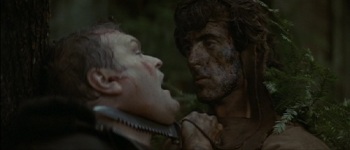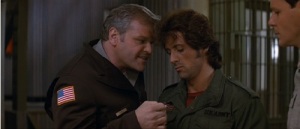John Rambo – Martyr or Monster?
First Blood (1982)
Directed by Ted Kotcheff
Starring Sylvester Stallone, Richard Crenna, Brian Dennehy and David Caruso
Based on a novel by David Morell
 First Blood was in many ways the film that made Sylvester Stallone a movie star. Before being cast as John Rambo his only hit films had been the first two Rocky films. Films such as F.I.S.T. and Paradise Alley were critical and commercial failures that are rarely mentioned even among his most hardcore fans. First Blood was the film that pushed him through to stardom. While this was great for Stallone it was also unfortunate that the film First Blood and the character of John Rambo got caught up in the franchise machinery of Hollywood. While the other Rambo films are entertaining in their own right First Blood has a depth that is rarely mentioned amongst film scholars. These depths are not obvious on a first viewing and have only just become apparent to me now in 2013. The two points I want to address are the Frankenstein themes and the Jesus themes that run through this film.
First Blood was in many ways the film that made Sylvester Stallone a movie star. Before being cast as John Rambo his only hit films had been the first two Rocky films. Films such as F.I.S.T. and Paradise Alley were critical and commercial failures that are rarely mentioned even among his most hardcore fans. First Blood was the film that pushed him through to stardom. While this was great for Stallone it was also unfortunate that the film First Blood and the character of John Rambo got caught up in the franchise machinery of Hollywood. While the other Rambo films are entertaining in their own right First Blood has a depth that is rarely mentioned amongst film scholars. These depths are not obvious on a first viewing and have only just become apparent to me now in 2013. The two points I want to address are the Frankenstein themes and the Jesus themes that run through this film.
 First, there are the parallels between Rambo and Teasle (Brian Dennehy) with the Jesus and Pontius Pilate dynamics. Teasle does not necessarily hate John Rambo, he has a duty to keep the peace and part of keeping the peace is in keeping out those that threaten the existence of the quiet community that Teasle needs to maintain. Rambo to Teasle is not really a person he is a representation of the anarchy of war and stands as an open wound of Americana that has yet to heal at the time when First Blood takes place. Rambo is a mirror of the American soul and demonstrates an element of humanity that most would rather not look at. Whereas Pontius Pilate did not necessarily hate Jesus or even want to crucify him it was something he saw as being his duty and this is part of what makes him such a fascinating and tragic character. There are also images that connect this theme such as stripping Rambo down in the cell, the flashbacks of being tortured and tied up to a device not unlike the image of a crucifix. Then there is the resurrection in the final act where Rambo is presumed dead after being sent into the mine that the towns people blew up with a grenade launcher.
First, there are the parallels between Rambo and Teasle (Brian Dennehy) with the Jesus and Pontius Pilate dynamics. Teasle does not necessarily hate John Rambo, he has a duty to keep the peace and part of keeping the peace is in keeping out those that threaten the existence of the quiet community that Teasle needs to maintain. Rambo to Teasle is not really a person he is a representation of the anarchy of war and stands as an open wound of Americana that has yet to heal at the time when First Blood takes place. Rambo is a mirror of the American soul and demonstrates an element of humanity that most would rather not look at. Whereas Pontius Pilate did not necessarily hate Jesus or even want to crucify him it was something he saw as being his duty and this is part of what makes him such a fascinating and tragic character. There are also images that connect this theme such as stripping Rambo down in the cell, the flashbacks of being tortured and tied up to a device not unlike the image of a crucifix. Then there is the resurrection in the final act where Rambo is presumed dead after being sent into the mine that the towns people blew up with a grenade launcher.
 The usage of the local hunters forming a pack and Rambo almost killing the child is a subtly reference to Frankenstein. Where Rambo had a relationship to Teasle that was not unlike Pontius Pilate and Jesus, Rambo’s relationship to Col. Samuel Trautman (Richard Crenna) character is not unlike that of Dr Frankenstein and his monster. This is the man who claimed to have made Rambo.
The usage of the local hunters forming a pack and Rambo almost killing the child is a subtly reference to Frankenstein. Where Rambo had a relationship to Teasle that was not unlike Pontius Pilate and Jesus, Rambo’s relationship to Col. Samuel Trautman (Richard Crenna) character is not unlike that of Dr Frankenstein and his monster. This is the man who claimed to have made Rambo.
Therefore, Rambo is essentially a creation of the American military and barely registers as a human being. Rambo is a thing to certain degree. He is an assembled creature of military training and engineering. What remains are Rambo’s base instincts for survival. This is something he shares in common with Frankenstein’s monster. This is most evident where he encounters the boy with the hunting rifle. Rambo comes close to killing the kid before his humanity returns ever so slightly. It follows from this scene to the hunters forming a mob paralleling the Frankenstein chase into the windmill.
On one side we have a Pontius Pilate character and on the other we have a Dr Frankenstein character. ‘How can Rambo be both a Martyr while also being a monster?’ you may ask. My answer is: Rambo represents the nothingness of the world that people feel the need to fill in and mirror with their own anxieties and ego’s. Teasle needed a threat to protect his town against and Richard Crenna needed to create a monster to protect his country that eventually turns against his country when under the threat of the man wanting to protect his town. Whereas the Frankenstein Monster was created with the best intentions and purpose, once that purpose was met the monster is left to the world without a purpose. Because the monster looks like a threat he becomes a threat. Rambo was that monster but he was also a sacrifice for the purposes of maintaining peace in the world but this peace was just a veiled illusion and Rambo will become whatever those that shape him need him to be.
Posted on March 13, 2013, in Essays, Great Films and tagged brian dennehy, Existentialism, F.I.S.T.. Paradise Alley, Franchise, frankenstein, Hollywood, Jesus, military, nothingness, pontius pilate, Post Traumatis Stress Disorder, Rambo, richard crenna, Rocky, sylvester stallone, Ted kotcheff, Trautman, War. Bookmark the permalink. 3 Comments.
Reblogged this on Anamorphic Tilt and commented:
I made some minor updates and corrected one of the videos. If you haven’t read this yet, it is an examination of First Blood paralleling Rambo with Frankenstein and Jesus. I am not sure how good my reasoning is but I welcome any feedback you may have.
LikeLike
I really liked this review. I hadn’t noticed those parallels before but agree with them. This was a great movie that really started a ridiculous franchise. Reading this I can see this movie is even deeper than I considered before. I wrote my own review of about it a year or so ago. http://themoviesnobs.wordpress.com/2012/06/07/first-blood/
LikeLike
Thanks for the feedback. It is a very powerful film. You should check out Ted Kotcheff’s (Director) Australian film called Wake in Fright. There has never been another Australian film portrayed with this kind of intensity and honesty. It was almost like a Sam Peckinpah outback movie. Like Peckinpah Kotcheff seems to understand human savagery and the need for connection through violence on a very deep level.
LikeLiked by 1 person